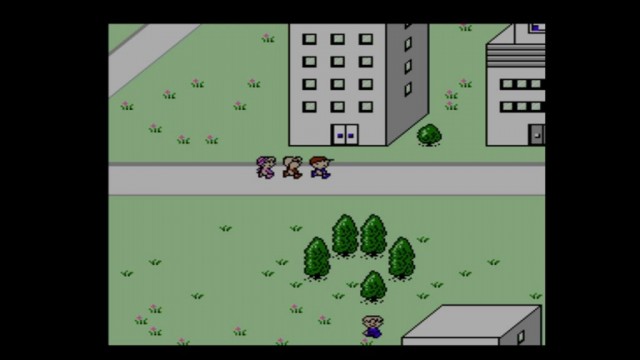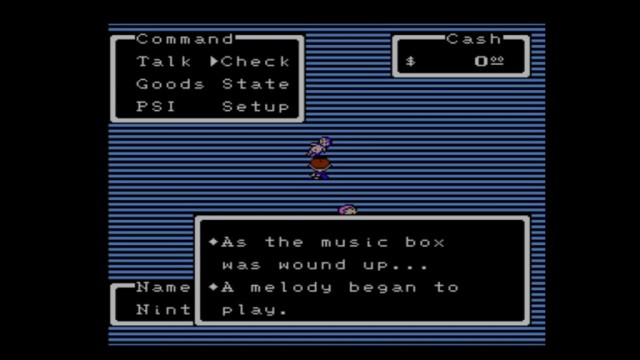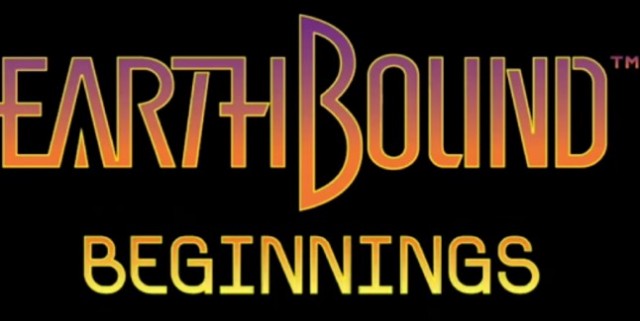Three months later, the name EarthBound Beginnings is still foreign to my ears. In my thirteen years as an EarthBound fan, the NES title that never left Japan was referred as Mother (which just so happens to be the Japanese name for the trilogy) or the fan-christened name EarthBound Zero. Then there’s the matter of how the game was to be localized under the name of EarthBound— that’s right, the same name Mother 2 would receive in America six years later. Nintendo hasn’t touched the hitherto unreleased ROM, so the evidence is plain as day on the title screen.
And if all that wasn’t confusing enough, there’s the shock that the game actually came out in America nearly two decades later. EarthBound finally arriving on the Virtual Console two years ago was already a miracle, but to be gifted with a game canceled for American release? It’s too good to be true, and yet it is.
But why do so many, including myself, hold this series so near and dear to our hearts? It may have to do with the series’s bizarre origin story, as the concept was birthed not from any one Nintendo developer, but a copywriter/essayist by the name of Shigesato Itoi. Having reached celebrity status in Japan for writing Studio Ghibli film advertisements, it came as a shock that Mr. Itoi would turn to video games looking for a pet project. But unlike other throwaway celebrity game tie-ins, this project would not only be under guidance of Mario creator Mr. Miyamoto, but would spawn a new spin on the popular RPG genre: a scenario starring not warriors and high fantasy, but children in modern times.

In that respect, EarthBound Beginnings is no different from the sequel Western audiences are familiar with. You start out as a boy in a red cap (who, like Ness, has a default Nintendo-inspired name: Ninten). There are no moblins or slimes lurking around, but instead aliens, zombies, and brainwashed hippies. And don’t worry: if you’re ever tired and need a break, you can come home and have Mom whip you up a batch of whatever you entered as your favorite food. In short, the series represents the nostalgia and the apparent magical realism of youth.
But that’s where the similarities end. To fully enjoy Beginnings, you have to push EarthBound out of your mind. Context is necessary, so conveniences like the rolling HP meter and insta-killing weak enemies aren’t here to help you; in other words, expect higher difficulty and some hefty grinding. This does not excuse any flaws found within the game’s design, but holding your hand is the least of Beginnings‘ concern. As many EarthBound fans profess to giving up the game in frustration, it can be argued maybe Itoi screwed around with conventional game design a tad too much. For example, the game sets up certain scenarios that never properly resolve themselves, as seen in the beginning with Podunk’s zombie problem. Yes, we rescue the lost girl who wandered into the cemetery, but the actual zombies are never fended off. This, in turn, relates to the game’s absence of boss battles– typically, a boss battle precedes a shift in game progression, so the lack of them here puts a dent in that. And speaking of progression, that’s not even getting into how it can be far too vague in telling the player where to go next.

So, yes, EarthBound Beginnings is a flawed work, but Itoi’s eccentric writing grants the game a heart found hardly anywhere else. From Magicant’s swimming cats to the janitor complaining about his wife, the world of Beginnings is filled with an innate comedic genius (if you decline a doctor’s medical treatment, he’ll state “Fine, die all on your own. I’ll phone a mortician”) contrasted by a level of poignancy that can hit hard (the jesters, wizards, and forgotten people of Magicant are enough to induce tears). Not to the grimmer levels of Mother 3, mind, but still a mile above the normally cheery EarthBound.
So much of this has to do with the music score, helmed by former Nintendo veteran Hirokazu Tanaka and industry outsider Keiichi Suzuki. The game’s themes of friendship and various forms of love are expressed via sound– from how the overworld theme switches over to a more upbeat song when Ninten’s joined by a friend (perhaps both are familiar to those who’ve played Smash Bros. Melee?) to a slow, captivating waltz exploring young love. Eight Melodies, which may as well be the game’s main theme, is masterfully reprised throughout the game and is undoubtedly the most melancholic tune ever processed on NES’s sound chips.
In that case, it’s safe to conclude EarthBound Beginnings suffers form a dysfunction between theme and actual play, but how much does that matter? EarthBound Beginnings is not the masterpiece EarthBound or Mother 3 are, but what we have here is one of the very first examples of a game daring to break outside the conventions of action, high-scores, and even gameplay itself. As the blueprint that would pave the way for Itoi’s future classics, it’s more than worth the purchase for any Nintendo fan.




 ShareThis
ShareThis








How about the third game now, Nintendo? See how long that takes to come out. Another 26 or so years?